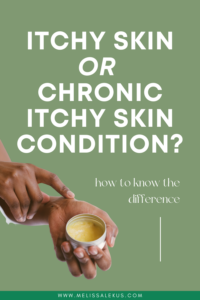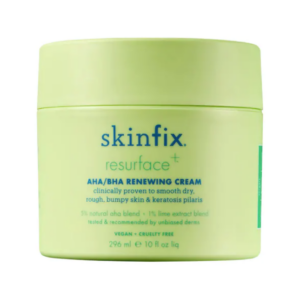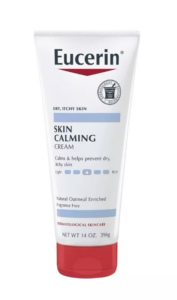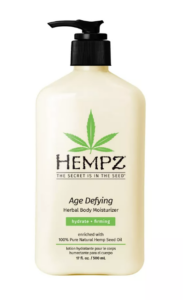December 2022
Would it be oversharing if I told you that as soon as our weather changes to cold my entire body gets dry and itchy? And would you be horrified to know that I am not a huge fan of applying lotion to my legs or body?
I am diligent at applying product to my face and neck on a consistent basis but I don’t tend to have issues with dryness on my face. But goodness, my legs, and torso can get so dry that they feel tight and itchy and I just want to claw the skin off my body.
As the outside temp drops, we bump up our thermostat which pulls the moisturizer out of the air resulting in a lack of humidity. Cold air and wind can cause the lipids that bind our skin cells together to freeze and/or break. We see that as flakey skin which is actually an impaired barrier. Folks that suffer from eczema or other skin conditions might see flare-ups increase during the winter. This is much harder to correct on our face but can be easily resolved on our bodies by consistently applying thick lotion.
If you already run dry, winter weather conditions can exacerbate it.
Itchy skin, or pruritus, is a common symptom that can be caused by a variety of underlying conditions. It can be a minor annoyance or a severe, debilitating condition that interferes with daily life.
An “itchy skin condition” generally refers to a skin condition that is characterized by itching as a primary symptom. Some examples of itchy skin conditions include eczema, psoriasis, and dermatitis. These conditions may be diagnosed by a healthcare provider after a physical examination and may require treatment with medications or other therapies.
If you go to the dermatologist for itchy skin and they tell you you have dermatitis, that is just a fancy way of saying they don’t know what it is but they confirm it is itchy.
“Winter itch is brought on by cold, dry air that pulls moisture out of your skin.”

Medically-diagnosed Itchy Skin
This refers to an itchy skin condition that has been evaluated and diagnosed by a healthcare provider. The provider may ask about the location and duration of the itching, any other symptoms that may be present, and any medications or substances that may be causing or worsening the itching. They may also perform a physical examination and possibly order tests to help determine the cause of the itching and guide treatment.
It’s important to note that not all cases of itchy skin require medical attention. In some cases, the cause of the itching may be something as simple as dry skin, which can be relieved with moisturizers and other over-the-counter remedies. However, if the itching is severe, persistent, or accompanied by other symptoms, it’s important to see a healthcare provider for a proper evaluation and treatment.
If you are experiencing itchy skin once in a while maybe from dry skin or due to weather changes, you can topically treat it with a moisturizer and look out for these ingredients:
- Ceramides: These are lipid molecules that help to repair and maintain the skin barrier, which can be damaged in conditions like eczema. Moisturizers with ceramides can help to restore the skin barrier and reduce itching.
- Glycerin: This is a humectant that helps to draw moisture into the skin. It can be particularly helpful for dry, itchy skin.
- Colloidal oatmeal: This ingredient has anti-inflammatory and skin-soothing properties and has been shown to be effective in relieving itching in conditions like eczema.
- Niacinamide: This is a form of vitamin B3 that has anti-inflammatory and skin-restoring properties. It can help to reduce redness and irritation associated with itchy skin.
- Aloe vera: This plant extract has soothing and moisturizing properties that can help to reduce itching and inflammation.
Melissa’s Quick Daily Solutions
Here are my solutions for your body itch, which differ from the advice I would give you if we were talking face.
Tip 1
Apply thick moisturizer: I use whatever cream or moisturizer I have around even if it says hand cream.
Here are some that I like in particular:
Tip 2
Avoid showers that are too hot or too long.
Hot water strips your skin of its natural oils, causing dryness and redness.
It is helpful to apply a moisturizer after showering or washing your hands. Your skin needs that moisture replenished.
If moisturizer isn’t solving the problem, try a humidifier, the humidity will provide your skin moisturizer and even help it hold on to the body creams you are applying during the day.
Lastly, don’t forget the cuticles of your fingers and toes, nail oil can really help you keep those nail beds hydrated and healthy.
Conclusion
Itchy skin can be incredibly uncomfortable and perhaps unsightly if you are clawing until you bleed. Remember that itchy skin is caused by a number of reasons such as cold weather, wind, heaters, and a lack of humidity.
It’s important to note that every person’s skin is different, and what works for one person may not work for another. It may be helpful to try a few different ingredients to see which one works best for your specific needs. It’s also a good idea to consult with a healthcare provider or dermatologist if you have severe or persistent itchy skin, as they can help to determine the cause and recommend the appropriate treatment.
Want more options? Click here to see all the products I recommend for helping heal itchy skin.







Leave a Reply